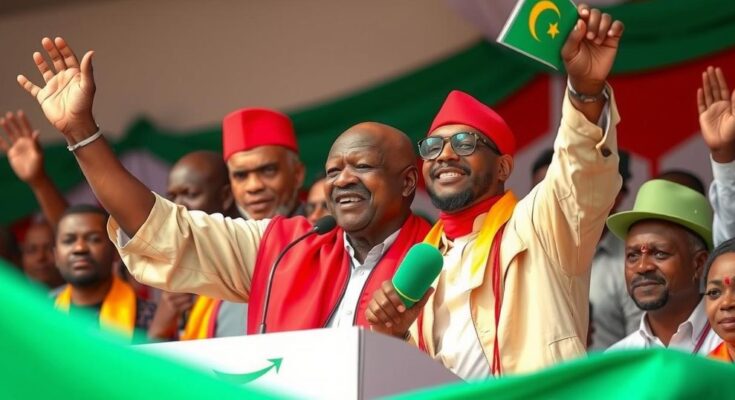Chad’s ruling Patriotic Salvation Movement won a majority in the recent parliamentary elections, held for the first time in over a decade, despite a boycott from opposition parties. The provisional results show the PSM obtained 124 seats out of 188, with a voter turnout of 51.5%. These elections follow the military takeover by Mahamat Idriss Deby, underscoring the ongoing challenges facing the nation.
N’DJAMENA, Chad — The ruling Patriotic Salvation Movement (PSM) has secured a majority in Chad’s parliamentary elections, which were held last month amid significant opposition boycott. Provisional results, announced by electoral commission head Ahmed Bartchiret, revealed that the PSM garnered 124 out of 188 parliamentary seats, with a reported voter turnout of 51.5%. This election marked a critical turning point for Chad, as it was the first parliamentary contest in over a decade.
The elections took place following the military takeover by Mahamat Idriss Deby in 2021 after the death of his father, the long-standing president Idriss Deby Itno. Deby had framed these elections as a step towards achieving the much-anticipated decentralization of power across regional and municipal divisions. However, the opposition, including more than ten parties led by the Transformers party, called the election a “charade” and chose not to participate, echoing concerns over the legitimacy of the electoral process witnessed during the previous presidential vote.
Chad continues to face a multitude of security challenges, including militant attacks from Boko Haram in the Lake Chad region and deteriorating relations with France, a historically strong ally. This backdrop underscores the weight of the ruling party’s electoral victory, which analysts suggest will further entrench President Deby’s political power. Although the main opposition parties have yet to respond to the results, there is an underlying tension regarding the credibility and fairness of the electoral process at this juncture in Chad’s political evolution.
The parliamentary elections in Chad were crucial as they represented the first such opportunity for citizens in over a decade, occurring in a context marked by the military leadership of Mahamat Idriss Deby since 2021. Following the death of longtime president Idriss Deby Itno, the new ruler is attempting to navigate the country’s political landscape while addressing pressing security issues, notably from extremist groups like Boko Haram and the strain in foreign relations, particularly with France. The ruling party’s significant gain in parliamentary seats is viewed by some as a consolidation of power, especially in light of the noted boycott by the primary opposition parties, who questioned the elections’ legitimacy.
In summary, the ruling Patriotic Salvation Movement’s clear majority in the parliamentary elections amidst a boycott from major opposition parties illustrates a critical moment in Chad’s political trajectory. With a history of disputed electoral legitimacy, the election results indicate a consolidation of power for Mahamat Idriss Deby’s regime. Given the current security challenges and international relations tensions, the implications of this electoral outcome will be significant for Chad’s governance and stability moving forward.
Original Source: www.seattletimes.com




